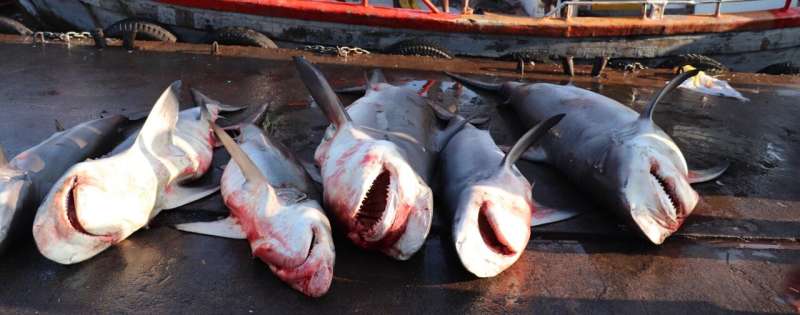#Sharks in protected area attract illegal fishers

“#Sharks in protected area attract illegal fishers”

Thousands of sharks have been illegally caught in a Marine Protected Area (MPA) in the Indian Ocean, new research shows.
The MPA was created in 2010 around the Chagos Archipelago, also known as the British Indian Ocean Territory (BIOT), banning all fishing there.
The new study examined information on illegal fishing in the MPA—a vast (640,000 km²/250,000 mi2) area containing pristine and remote reefs.
Enforcement data suggests more than 14,000 sharks were caught in the MPA from 2010-20, but discussions with fishers in the region suggest the true number was “considerably higher”.
The study was carried out by the University of Exeter and ZSL (Zoological Society of London), Oceanswell and MRAG Ltd.
“Enforcement of MPA rules in a large, remote area such as this is extremely difficult,” said lead author Claire Collins, of the University of Exeter.
“Our findings highlight the threat of illegal fishing to sharks in the BIOT MPA, which is home to critically endangered species such as the oceanic whitetip and scalloped hammerhead.
“Fishers often target reef areas, where many of the sharks are juveniles, and taking sharks at this life stage could be especially damaging to species numbers.
“However, it’s important to note that—despite evidence of shark fishing—the MPA still provides a vital refuge in the Indian Ocean, and shark numbers there are still much higher than most other places.
“Many shark species in this region are under intense pressure from fishing.
“Following the recent news that the Maldives was considering lifting its shark-fishing ban, the importance of large areas within the Indian Ocean where shark fishing is banned was brought to everyone’s attention.
“This study emphasises the need to ensure that sharks within these important areas are fully protected.”
As part of the study, Oceanswell researchers carried out interviews and ran focus groups with fishers in two Sri Lankan communities previously associated with illegal fishing in the BIOT MPA.
Fishers told the researchers that vessels often fished in the MPA without being detected, providing “clear evidence that total extraction was considerably higher” than the estimate of 14,340 based on detected vessels, the study says.
“It is crucial to work with fishing communities to understand where, when and why people fish illegally—and how we can improve deterrence,” said final author Tom B Letessier.
“For example, we found fishers had very different ideas of the fines they could face, and some felt there were very unlikely to be caught—so improving awareness of the sanctions, in addition to increasing the probability of being caught, could be beneficial.”
Efforts are under way to improve enforcement in the MPA, including by increased use of satellite tracking of vessels and ensuring enforcement is responsive to the threat of illegal fishing.
This study highlights the value of interacting with fishers themselves to obtain information about the pressures they are facing and what motivates their behaviours.
Of the 188 vessels investigated by the BIOT MPA patrol boat from 2010-20, 126 were suspected of illegal fishing—and 97% of these targeted sharks.
More than three quarters of suspected vessels were from Sri Lanka, but a growing minority came from India—and these tended to be larger and could therefore take many more sharks.
“The threats to a large MPA like this one are constantly changing, so management of the MPA has to adapt too,” Collins said.
The study was funded by grant ID is BPMS 2017-12 from the Bertarelli foundation, as part of the Bertarelli Programme of Marine Science.
The paper, published in the journal Frontiers in Marine Science, is entitled: “Understanding persistent non-compliance in a remote, large-scale marine protected area.”
Shark fishing bans partially effective: study
Frontiers in Marine Science, DOI: 10.3389/fmars.2021.650276
Citation:
Sharks in protected area attract illegal fishers (2021, May 10)
retrieved 10 May 2021
from https://phys.org/news/2021-05-sharks-area-illegal-fishers.html
This document is subject to copyright. Apart from any fair dealing for the purpose of private study or research, no
part may be reproduced without the written permission. The content is provided for information purposes only.
If you liked the article, do not forget to share it with your friends. Follow us on Google News too, click on the star and choose us from your favorites.
For forums sites go to Forum.BuradaBiliyorum.Com
If you want to read more Like this articles, you can visit our Science category.




